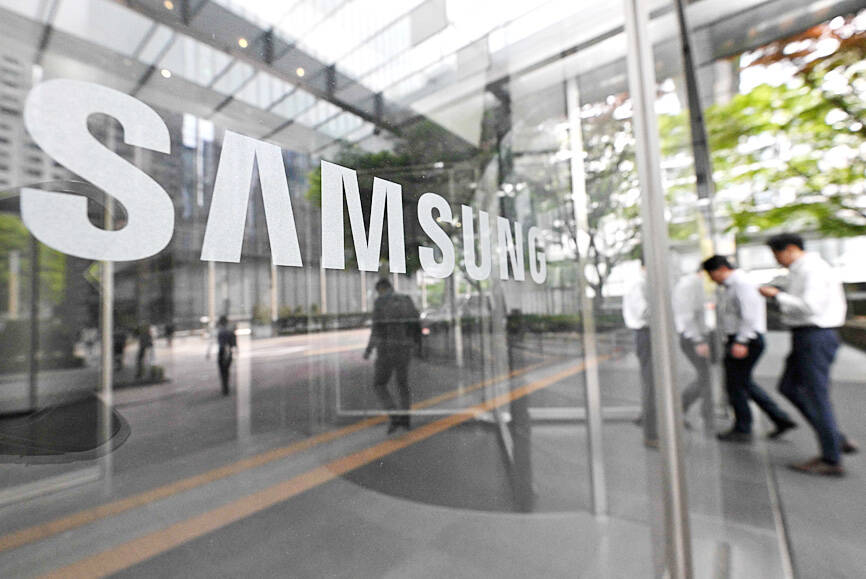Samsung Electronics Co yesterday reported a 10-fold annual increase in operating profit for the first quarter of the year as the expansion of artificial intelligence (AI) technologies drives a rebound in the markets for computer memory chips.
The South Korean semiconductor and smartphone giant said its operating profit for the January-to-March quarter came in at 6.6 trillion won (US$4.8 billion), up from the 640 billion won it earned during the same period last year.
Revenue rose 12.8 percent to 71.9 trillion won, driven by higher prices for memory chips and robust sales of its flagship Galaxy S24 smartphones, the company said.

Photo: AFP
Samsung earned 1.91 trillion won in operating profit from its semiconductor business, marking the division’s first quarterly profit since the fourth quarter of 2022, as the chip market continues to recover from a cyclical slump deepened by the COVID-19 pandemic and global trade tensions.
The company projected that the memorychip market would remain robust in the coming months, driven by the expansion of generative AI technologies, which are increasing demand for conventional chips used in servers and advanced chips designed to process AI, including high-bandwidth memory (HBM).
Responding to increased demand for AI chips, Samsung last month started mass production of its latest HBM chips — 8-layer HBM3E — and plans to start producing the 12-layer version of the chips during the second quarter, the company said.
“In the second half of 2024, business conditions are expected to remain positive with demand — mainly around generative AI — holding strong, despite continued volatility relating to macroeconomic trends and geopolitical issues,” Samsung said in a statement.
For smartphones, the company would continue to focus on boosting sales of its flagship device, the Galaxy S24, which is built with an array of new features enabled by AI, including live translation during phone calls in 13 languages and 17 dialects.
Samsung said it plans to expand AI features beyond the S24 to other mobile devices as it expects the technologies to drive growth in the smartphone market in the coming months amid improvements in global consumer spending.

Semiconductor shares in China surged yesterday after Reuters reported the US had ordered chipmaking giant Taiwan Semiconductor Manufacturing Co (TSMC, 台積電) to halt shipments of advanced chips to Chinese customers, which investors believe could accelerate Beijing’s self-reliance efforts. TSMC yesterday started to suspend shipments of certain sophisticated chips to some Chinese clients after receiving a letter from the US Department of Commerce imposing export restrictions on those products, Reuters reported on Sunday, citing an unnamed source. The US imposed export restrictions on TSMC’s 7-nanometer or more advanced designs, Reuters reported. Investors figured that would encourage authorities to support China’s industry and bought shares

FLEXIBLE: Taiwan can develop its own ground station equipment, and has highly competitive manufacturers and suppliers with diversified production, the MOEA said The Ministry of Economic Affairs (MOEA) yesterday disputed reports that suppliers to US-based Space Exploration Technologies Corp (SpaceX) had been asked to move production out of Taiwan. Reuters had reported on Tuesday last week that Elon Musk-owned SpaceX had asked their manufacturers to produce outside of Taiwan given geopolitical risks and that at least one Taiwanese supplier had been pushed to relocate production to Vietnam. SpaceX’s requests place a renewed focus on the contentious relationship Musk has had with Taiwan, especially after he said last year that Taiwan is an “integral part” of China, sparking sharp criticism from Taiwanese authorities. The ministry said

CHANGING JAPAN: Nvidia-powered AI services over cellular networks ‘will result in an artificial intelligence grid that runs across Japan,’ Nvidia’s Jensen Huang said Softbank Group Corp would be the first to build a supercomputer with chips using Nvidia Corp’s new Blackwell design, a demonstration of the Japanese company’s ambitions to catch up on artificial intelligence (AI). The group’s telecom unit, Softbank Corp, plans to build Japan’s most powerful AI supercomputer to support local services, it said. That computer would be based on Nvidia’s DGX B200 product, which combines computer processors with so-called AI accelerator chips. A follow-up effort will feature Grace Blackwell, a more advanced version, the company said. The announcement indicates that Softbank Group, which until early 2019 owned 4.9 percent of Nvidia, has secured a

TECH SECURITY: The deal assures that ‘some of the most sought-after technology on the planet’ returns to the US, US Secretary of Commerce Gina Raimondo said The administration of US President Joe Biden finalized its CHIPS Act incentive awards for Taiwan Semiconductor Manufacturing Co (TSMC, 台積電), marking a major milestone for a program meant to bring semiconductor production back to US soil. TSMC would get US$6.6 billion in grants as part of the contract, the US Department of Commerce said in a statement yesterday. Though the amount was disclosed earlier this year as part of a preliminary agreement, the deal is now legally binding — making it the first major CHIPS Act award to reach this stage. The chipmaker, which is also taking up to US$5 billion